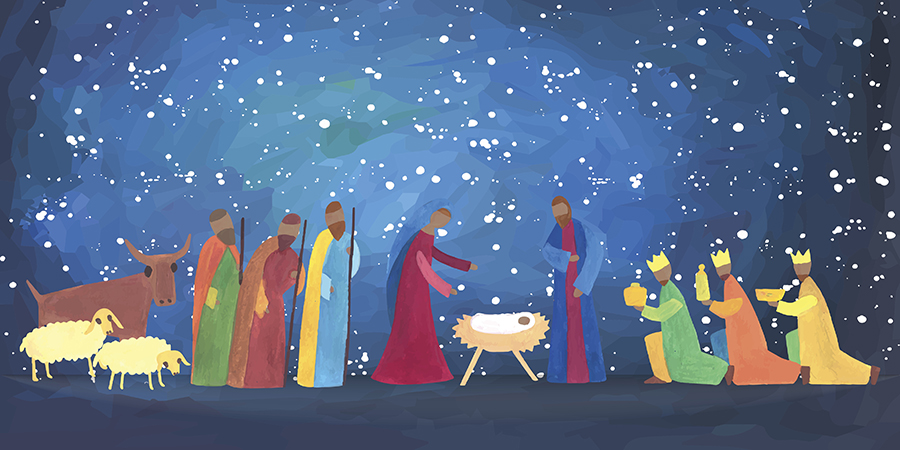
There’s a strange word in the opening verse of the Christmas carol “I Heard the Bells on Christmas Day.” It’s perhaps one you’ve never noticed.
Penned in the midst of the Civil War by the great poet Henry Wadsworth Longfellow, the song has a backstory of personal loss and tragedy. And though the poet hinted at the age-old question of God’s sovereignty and human frailty, the song ends on a positive note with a rousing affirmation that evil cannot win.
Still, Longfellow slips in a description at the beginning that gives one pause, a word so ill-placed, it seems, that at least one contemporary musician has changed it. On that Christmas Day so long ago, Longfellow described the bells’ tolling of Peace on Earth as “wild and sweet.”
“Sweet,” when referring to peace, is understandable, but “wild?” What did Longfellow mean? Perhaps it is troubling because deep-down, we understand.
Dr. Ken Taylor, professor of missions and a long-time pastor, has walked beside countless people on the path of grief and heartache.
“Life is hard,” Taylor said. “People we know and love die. Crime and injustice surround us. Peace seems so far away. Some days it seems that there is no hope for us, those we love, our society, and our world.”
Could it be that peace truly is wild, something we chase after but can never catch? Is peace something so powerful that humans can neither forge it nor grasp it in our hands?
More importantly, in the midst of life-shattering pain, is it even possible to know peace?
Longfellow ended his poem with a resounding Yes—peace is found in the knowledge that the ever-watching God never sleeps. While an ever-watching God is a tremendous and scriptural promise, an even greater promise is found in the incarnation, that is, that Jesus is Immanuel, God with us.
The promise of the incarnation is wild, because we cannot fully comprehend it, and sweet—because God is with us in joy and in pain. His name is Immanuel. And there is peace.
‘The Greatest Work Ever Done’
Dr. Adam Harwood, associate professor of theology, noted some important points about the incarnation that should guide believers in understanding what God has done.
First, Harwood pointed out, Jesus coming in the flesh reveals who God is.
“Because of the incarnation of the eternal Son, God the Father can be known,” Harwood said. Drawing from John 1:18 and Col. 1:15a, Harwood added, “If you want to know about God, then learn about Jesus.”
While some have pondered if Jesus, God the Son, understands human pain, this idea stems from a misunderstanding, Harwood said, adding that Jesus instead is the “prototype” for humanity, the model for what humans would be if not for the scars of sin.
“Because the eternal Son became truly human and was truly tempted, he can genuinely sympathize with the human condition and intercede for us with the Father (Hebrew 4:14-16),” Harwood said.
For those facing grief and heartache this Christmas, this is good news. Because Jesus was fully human, he understood human pain and heartache.
Billy Graham once wrote of what the incarnation means for human suffering and how it can transform pain.
“The doctrine of the incarnation means that God came right down amid the sin and confusion of this world,” Graham said. “It means that God was capable of participating in our pain, our suffering, our conflicts and our sorrows. It proves to us that His love was not just a vague theory sung in ancient sonnets or proclaimed by shepherd mystics of the backcountry. It was real, vibrant and realizable.”
The incarnation also shows that God is a personal God who wants to be known, who came “to seek and to save the lost” (Luke 19:10), and demonstrates His holiness and justice, Harwood said. Jesus was “the only perfect sacrifice,” the only one who could atone for human sin, and satisfy a holy God, Harwood explained, because He was both truly human and truly God.
The child in the Bethlehem manger was God breaking into human history and setting the world right. It is the message and promise of the incarnation, of Christmas.
“In the middle of a corrupt and fallen world Jesus did the greatest work ever done,” Taylor said. “In this darkness that sometimes seems so deep that we can never escape, the Light of the World shines forth with love and power so strong the darkest night can be swept away by just the presence of the one born in Bethlehem.”
Dealing with Grief at Christmas
Dr. Jeanine Bozeman, distinguished professor of social work, prepares NOBTS students to care for those who are grieving through a course she teaches, “Death, Loss and Grief,” a longtime favorite among students. The course is enriched by Bozeman’s own experience with grief and the loss of her beloved husband, Welby, eight years ago. One student told Bozeman at the end of the course, “I never had compassion until I took your class. This class connected my head to my heart.”
For those facing grief and loss, Dr. Bozeman recommends the following: